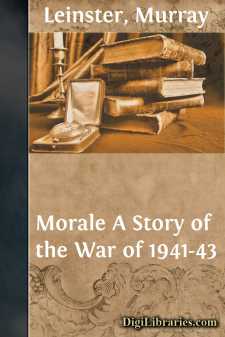Categories
- Antiques & Collectibles 13
- Architecture 36
- Art 48
- Bibles 22
- Biography & Autobiography 813
- Body, Mind & Spirit 142
- Business & Economics 28
- Children's Books 15
- Children's Fiction 12
- Computers 4
- Cooking 94
- Crafts & Hobbies 4
- Drama 346
- Education 46
- Family & Relationships 57
- Fiction 11828
- Games 19
- Gardening 17
- Health & Fitness 34
- History 1377
- House & Home 1
- Humor 147
- Juvenile Fiction 1873
- Juvenile Nonfiction 202
- Language Arts & Disciplines 88
- Law 16
- Literary Collections 686
- Literary Criticism 179
- Mathematics 13
- Medical 41
- Music 40
- Nature 179
- Non-Classifiable 1768
- Performing Arts 7
- Periodicals 1453
- Philosophy 64
- Photography 2
- Poetry 896
- Political Science 203
- Psychology 42
- Reference 154
- Religion 513
- Science 126
- Self-Help 84
- Social Science 81
- Sports & Recreation 34
- Study Aids 3
- Technology & Engineering 59
- Transportation 23
- Travel 463
- True Crime 29
Morale A Story of the War of 1941-43
by: Murray Leinster
Categories:
Description:
Excerpt
PART I
"... The profound influence of civilian morale upon the course of modern war is nowhere more clearly shown than in the case of that monstrous war-engine popularly known as a 'Wabbly.' It landed in New Jersey Aug. 16, 1942, and threw the whole Eastern Coast into a frenzy. In six hours the population of three States was in a panic. Industry was paralyzed. The military effect was comparable only to a huge modern army landed in our rear...." (Strategic Lessons of the War of 1941-43.—U. S. War College. Pp. 79-80.)
Sergeant Walpole made his daily report at 2:15. He used a dinky telephone that should have been in a museum, and a rural Central put him on the Area Officer's tight beam. The Area Officer listened drearily as the Sergeant said in a military manner:
It spouted a flash of bluish flame.
"Sergeant Walpole, sir, Post Fourteen, reports that he has nothing of importance to report."
The Wabbly, uncombatable engine of war, spreads unparalleled death and destruction—until Sergeant Walpole "strikes at the morale" of its crew.
The Area Officer's acknowledgment was curt; embittered. For he was an energetic young man, and he loathed his job. He wanted to be in the west, where fighting of a highly unconventional nature was taking place daily. He did not enjoy this business of watching an unthreatened coast-line simply for the maintenance of civilian confidence and morale. He preferred fighting.
Sergeant Walpole, though, exhaled a lungful of smoke at the telephone transmitter and waited. Presently the rural Central said:
"All through?"
"Sure, sweetie," said Sergeant Walpole. "How about the talkies tonight?"
That was at 2:20 P. M. There was coy conversation, while the civilian telephone-service suffered. Then Sergeant Walpole went back to his post of duty with a date for the evening. He never kept that date, as it turned out. The rural Central was dead an hour after the first and only Wabbly landed, and as everybody knows, that happened at 2:45.
But Sergeant Walpole had no premonitions as he went back to his hammock on the porch. This was Post Number Fourteen, Sixth Area, Eastern Coast Observation Force. There was a war on, to be sure. There had been a war on since the fall of 1941, but it was two thousand miles away. Even lone-wolf bombing planes, flying forty thousand feet up, never came this far to drop their eggs upon inviting targets or upon those utterly blank, innocent-seeming places where munitions of war were now manufactured underground.
Here was peace and quiet and good rations and a paradise for gold-brickers. Here was a summer bungalow taken over for military purposes, quartering six men who watched a certain section of coast-line for a quite impossible enemy. Three miles to the south there was another post. Three miles to the north another one still. They stretched all along the Atlantic Coast, those observation-posts, and the men in them watched the sea, languidly observed the television broadcasts, and slept in the sun. That was all they were supposed to do....












